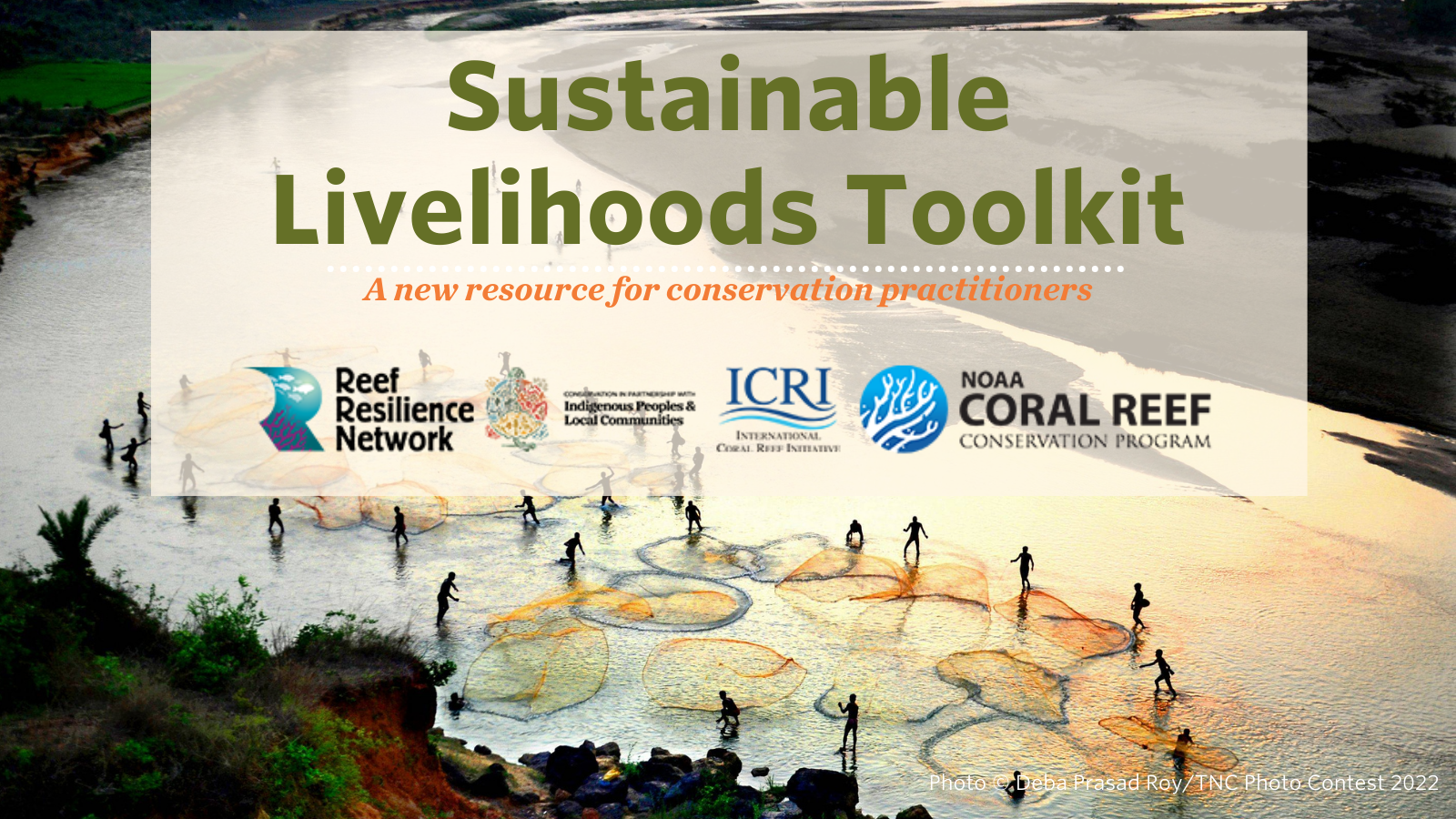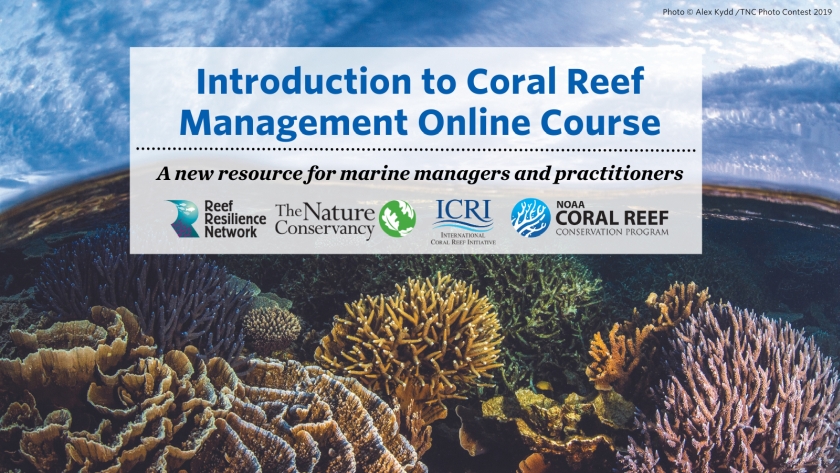Web Applications and Small-Scale Fishery Co-ops Shorten Value Chain for Small-Scale Fishers in South Africa
Location
Kleinmond, South Africa
The challenge
Small-scale fishing in South Africa historically was characterized by a system in which individual fishers were at the mercy of supply-chain middlemen and had no control over the prices they received for their diminishing catches. To improve their incomes, fishers expanded their efforts, therefore increasing pressure on the area’s already overexploited marine resources, which include west coast rock lobster and line-caught fish species.
Actions taken
South Africa’s rocky Kogelberg coast southeast of Cape Town is home to a UNESCO Biosphere Reserve where the World Wide Fund for Nature (WWF-South Africa, formerly World Wildlife Fund) is working with local fishers and community members to improve their fishing practices and access to markets.
Since the turn of the century, community protests in the area have forced the government to reconsider historic fishing rights which, during the Apartheid era, were primarily allocated to white people; black coastal communities had no fishing rights. Since democracy was introduced in South Africa, more opportunities have become available for black coastal communities to participate in small-scale fisheries; however, the government remains slow to implement these policies. In 2007, the Department of Environmental Affairs and Tourism (DEAT) convened a National Summit on small-scale fisheries and elected and mandated a national taskforce to oversee the process of developing policy that would include marginalized and formerly excluded fishers in South Africa. The Cabinet adopted the policy in 2012.
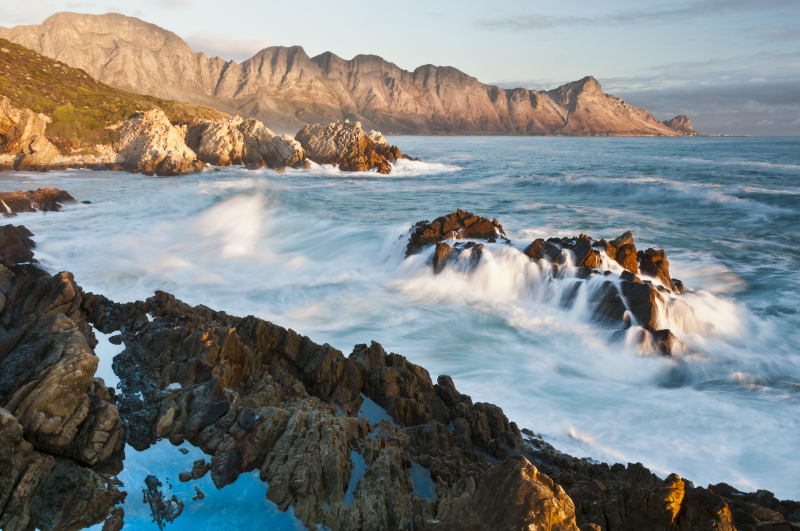
The rugged rocky shoreline of False Bay near Cape Town and site of the Kogelberg Biosphere Reserve. Photo © Peter Chadwick/WWF-SA
Policy reform creates opportunities to build local markets & strengthen sustainability
To enact the Small-Scale Fisheries Policy, the Marine Living Resources Act was amended in 2014 and regulations pertaining to Small-Scale Fishing were passed in 2016. The legislation allowed the Department of Agriculture, Forestry and Fisheries (DAFF) to start the process of identifying small-scale fishers and mobilizing these fishers into small-scale fishing co-operatives. Next, the government proceeded with a rights allocation process for the co-operative that granted legal access to a number of nearshore species for either commercial or subsistence purposes. In 2016, WWF-South Africa worked with the local community to form a nine-person women’s cooperative to buy locally caught line-fish species from recognized small-scale fishers in three Kogelberg fishing communities. The cooperative aimed to assist these women in accessing broader markets, and then selling the product at higher minimum prices negotiated with seafood restaurants. These fish were then sold at higher minimum prices to local restaurants, chefs, and retailers committed to sustainably caught fish. The intent of the cooperative was to shorten the value chain so that fishers have greater access to markets at better prices, in addition to contributing to local socio-economic development and help alleviate poverty.
Small-scale fishing co-operatives and allocation of small-scale fishing rights have now been established and granted in Northern Cape (2018), Eastern Cape (2019-2020) and KZN (2019-2020). Small-scale fishers in Western Cape have not been mobilized into co-operatives due to complaints of irregular processes. In response to these complaints, the Minister requested the court to review the process. A court ruling was provided in September 2022 for Department of Forestry, Fisheries, and the Environment (DFFE) to redo the process with the original applicants who applied in 2016. In waiting for the government to redo the small-scale fishing rights process in Western Cape, representatives of the Kogelberg community serve on the Kogelberg Marine Working Group to work together to improve ocean governance in the Kogelberg area.
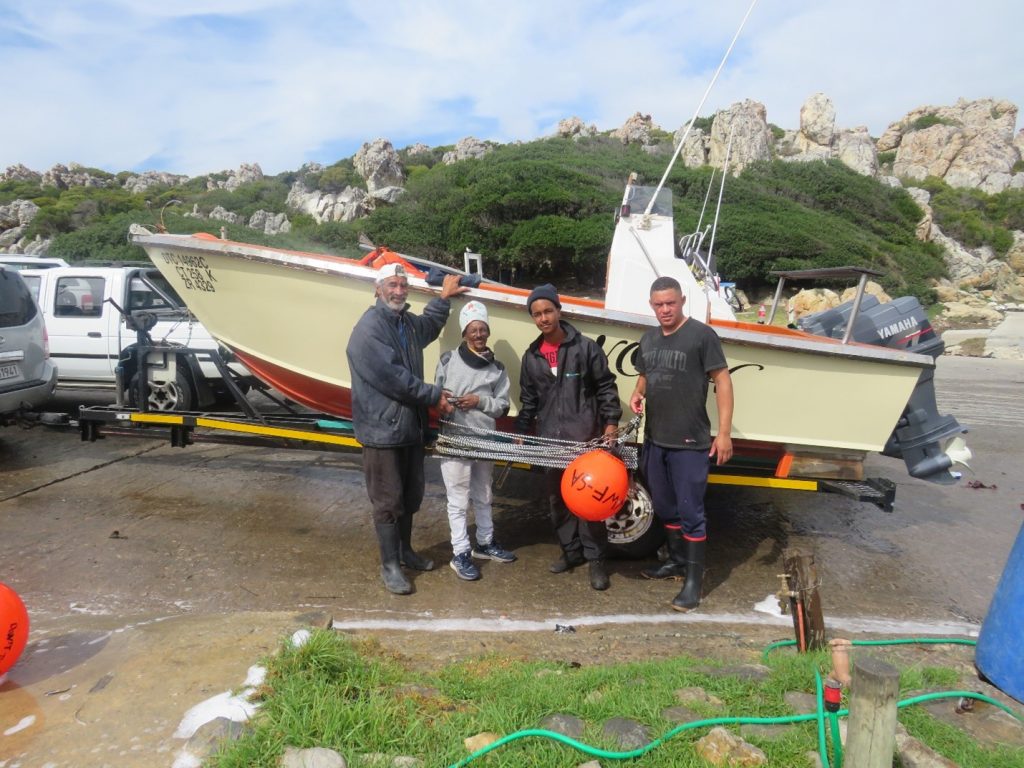
Kogelberg-based fishers with a monitoring apparatus. Photo © WWF South Africa
While the Small-scale Fishing Co-operatives have not been formed, WWF-South Africa has been working with 94 Kogelberg community fishers to onboard them onto the Abalobi fisher app and marketplace app. Abalobi fisher app acts as an “e-logbook” providing data dashboards, basic bookkeeping, and weather forecasting. Abalobi also provides supply chain traceability, financial services, and acts as a digital market for fisher groups. The Abalobi Marketplace feature gives fishers direct access to markets and restaurants in Western Cape and Cape Town thereby providing greater value for their catch.
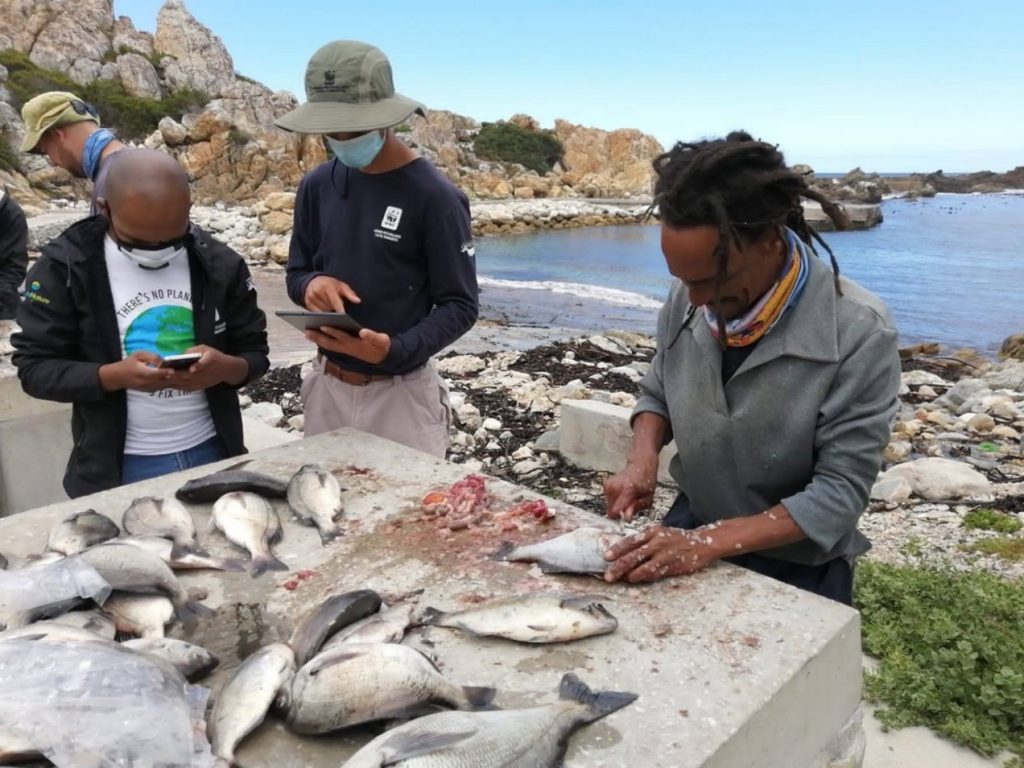
Logging catch using the Abalobi app. Photo © WWF South Africa
Policy Outcomes
WWF-South Africa and the Kogelberg Marine Working Group have adapted to the dynamic policy landscape of small-scale fisheries in South Africa and remain supportive of the local fisher communities despite the initial setbacks with the co-op development. The South African government is now in the process of redoing the small-scale fishery rights allocation process and WWF-South Africa stands ready to support government in service of the Kogelberg communities.
How successful has it been?
WWF-South Africa has been more successful in involving and empowering fishers in the Baited Remote Underwater Video systems (BRUVs) community science project, which gives fishers a greater understanding and appreciation of marine ecosystems. WWF has introduced BRUVs to aid in conservation efforts. The BRUVs enable fishers to become citizen scientists by supporting monitoring efforts inside and outside of the Betty’s Bay MPA and local fishing areas. The general goal of the BRUV project is to enhance fishers’ understanding of their surrounding marine environment.
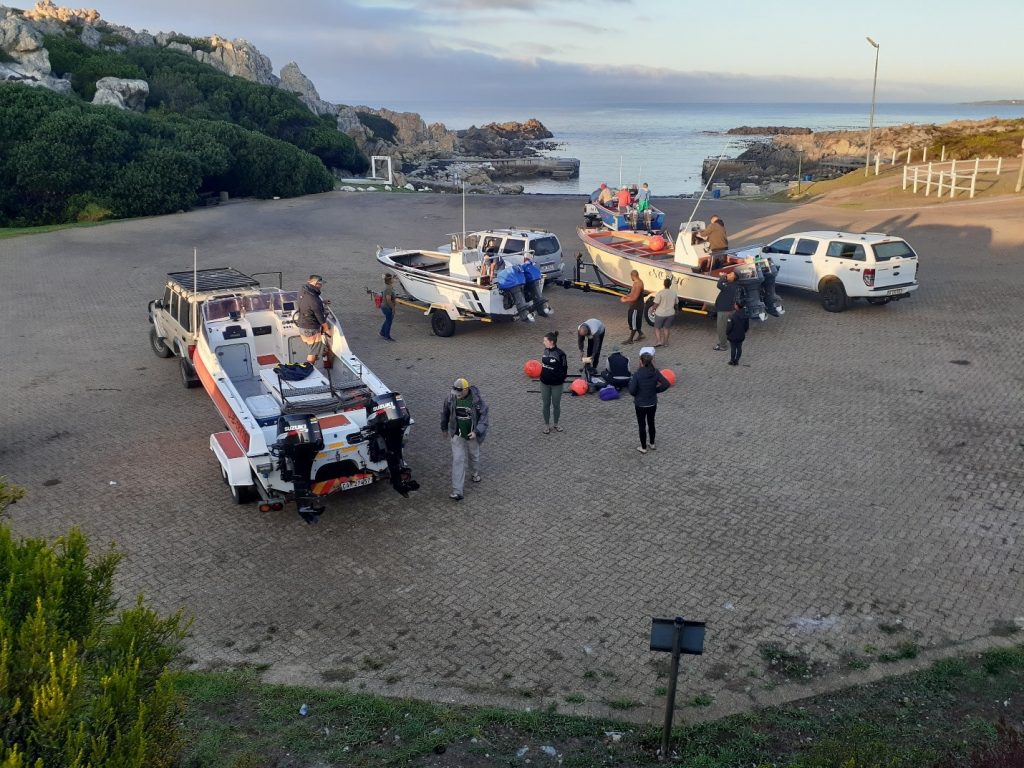
Preparing to deploy the BRUVs. Photo © WWF South Africa
Another successful WWF-South Africa programme is the empowerment of Marine Coastal Community Monitors (MCCMs) that have been appointed and trained from the three Kogelberg communities (Kleinmond, Betty’s Bay, and Pringle Bay). MCCMs monitor for human impact, bird counts, mammal counts, pollution, estuary health and functioning, and animal mortality along the coast. MCCMs collect data to support conservation efforts in the area, some of which has been used by Cape Nature in developing management plans for the Betty’s Bay MPA.
Lessons learned and recommendations
The project has included capacity building for co-op members, use of a mobile application to record catch data, and early-stage development of this local market. It should be emphasized that the six-month project timeline was too short to demonstrate positive ecological impact and also noted that providing immediate tangible benefits to fisherfolk would improve buy-in for future projects.
Funding summary
50in10 provided World Wildlife Fund South Africa (WWF-SA) with technical assistance and a $25,000 matching grant to support outreach and the salary for a local coordinator.
Embassy of Belgium Delegation of Flanders in South Africa
German Federal Ministry of Economic Cooperation and Development (BMZ)
Partners
Partners include World Wildlife Fund South Africa; Kogelberg community fishers; the Department of Forestry, Fisheries, and the Environment (DFFE); the Hangklip Kleinmond Tourism Bureau; the Overstrand Local Economic Development Office; Kogelberg Coast Marine Working Group; CapeNature; local restaurants; Abalobi; and South African Shark Conservancy (SASC)

